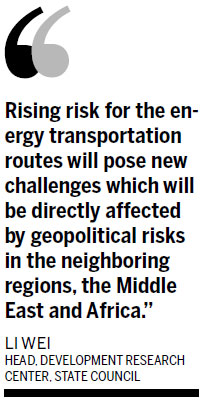China outlines strategy for energy sector
(China Daily) Updated: 2014-02-15 08:04New, cleaner sources, industrial transformation needed: Official
China's leading think tank has outlined a revamped energy strategy highlighting new energy and calling for industrial transformation.
In an article entitled "Foreseeing and Analyzing China's Future Energy Development" published by the People's Daily, the flagship newspaper of the Communist Party of China, on Wednesday, Li Wei, head of the Development Research Center of the State Council, said China must transform itself into a country of "security, greenery and efficiency" by 2030 or be faced with erratic supplies and insurmountable environmental challenges.

Li's article is based on two years of research led by the center and supported by more than 70 experts from Royal Dutch Shell Plc, Harvard University in the US and Tsinghua University in China, among others.
The growth of China's energy demand will slow remarkably thanks to the cooling of the economy, but there will be a higher dependency on impact of oil and natural gas.
By 2030, as much as 75 percent of China's oil might be imported. The dependency on overseas natural gas will also rise rapidly, bringing with it grave energy security concerns, Li warned.
Li is a former senior official of the State Council. He put energy security in a wider global context. By 2030, the world's energy supply will be much the same while demand will keep growing, partly because of the industrialization of emerging economies.
There is also a fundamental shift in the world energy supply, with consumption gravitating east and production moving westward.
By 2030, China and India are expected to account for half of the world's oil consumption. The US, on the other hand, will likely be the center for world oil production by 2020 and aims to become the leader in deciding oil and gas prices.
China's energy supply risks might be exacerbated by complicated and volatile geopolitical situations, Li warned.
Despite the US making breakthroughs in energy independence, it is unlikely to soften its grip on oil resources in the Middle East. Reduced dependence on foreign oil will make the US more hawkish in advancing its agenda in the region, making the world's energy market even more unpredictable.
|
 |
 |
- NHTSA says finds no 'defect trend' in Tesla Model S sedans
- WTO rare earth ruling is unfair
- Amway says 2014 China sales may grow 8%
- President Xi in Europe: Forging deals, boosting business
- CNOOC releases 2013 sustainability report
- Local production by Chery Jaguar Land Rover this year
- Car lovers test their need for speed in BMW Mission 3
- China stocks close mixed Monday

















